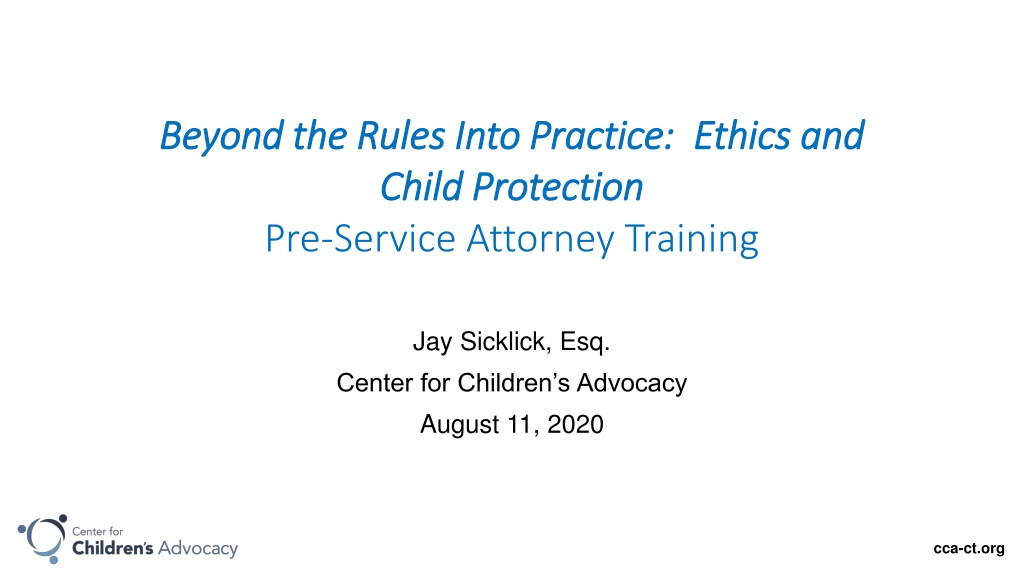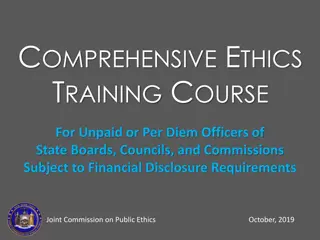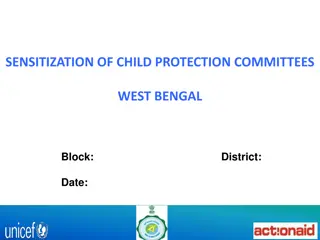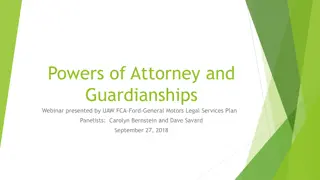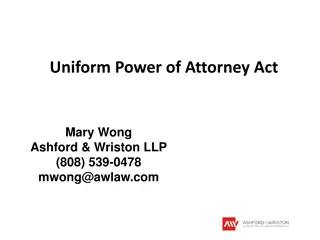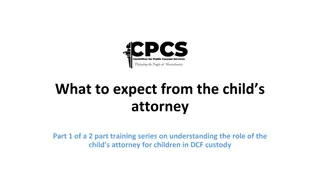Ethics and Child Protection: Pre-Service Attorney Training Overview
Understanding legal ethics, the Connecticut Rules of Professional Conduct, and ethical lawyering practices in child protection representation. The training covers key concepts, case examples, and ethical dilemmas to help attorneys navigate their roles effectively and ethically.
Download Presentation

Please find below an Image/Link to download the presentation.
The content on the website is provided AS IS for your information and personal use only. It may not be sold, licensed, or shared on other websites without obtaining consent from the author. Download presentation by click this link. If you encounter any issues during the download, it is possible that the publisher has removed the file from their server.
E N D
Presentation Transcript
Beyond the Rules Into Practice: Ethics and Beyond the Rules Into Practice: Ethics and Child Protection Child Protection Pre-Service Attorney Training Jay Sicklick, Esq. Center for Children s Advocacy August 11, 2020 cca-ct.org
The Goals Understanding Legal Ethics in a Different Mode of Practice Re-introduce the CRPC Capture the Highlights of Child Protection Representation in an Ethical Context Case examples to debate the issues before you get into hot water Keep you out of the Law Tribune cca-ct.org
Preliminary Quiz What is Rule 1.1 of the Connecticut Rules of Professional Conduct? cca-ct.org Conn. Rule Prof. Conduct 1.1
Preliminary Quiz The Connecticut Rules of Professional Conduct are merely advisory and serve as guidance for practicing attorneys? T or F? Running afoul of the law in your personal life (non-professional) conduct will not be considered a detrimental event by the Chief Disciplinary Counsel should your activity be reported to that office? T or F? cca-ct.org Conn. Rule Prof. Conduct 1.1
Preliminary Quiz It s okay to meet with your client 45 second before a court appearance on behalf of that client to discuss strategy at the hearing which might impact the outcome of the case? T or F? Judges, CSO s and court personnel talk about lawyers and share both the good and the bad about attorney conduct and competence amongst each other outside of court proceedings? T or F? cca-ct.org Conn. Rule Prof. Conduct 1.1
Preliminary Quiz Should you emulate this legal titan? Defense attorney Adam Reposa was given the maximum sentence of six months in jail for contempt of court on Wednesday. The order from Judge Paul Davis comes after he found Reposa in contempt on Sept. 12 for disrespecting Judge Nancy Hohengarten in a March drunken driving trial. Davis delayed punishment to review case documents. Austin American Statesman, 9/27/17 cca-ct.org Conn. Rule Prof. Conduct 1.1
What is Ethical Lawyering? Adherence to the Rules of Professional Conduct Representing a client with zeal and competence Knowing when to get help Preserving moral integrity cca-ct.org
Ethical Rules A Refresher Framework for ethical lawyering = knowing what you re doing and acting accordingly i.e. be prepared for the consequences Connecticut Rules of Professional Conduct Disciplinary in Nature not strategic (except for one). Serves as a basis for lawyer discipline but also provides guidance and direction for practicing lawyers on a daily basis. cca-ct.org
Ethical Rules A Refresher ABA Model Rules of Professional Conduct Connecticut Revisions to Rules (1983 present). Ethics 2000 and Conn. Changes. Effective October 2007. Rules work in accordance with statutory scheme ( 46b-129a) Room for interpretation in juvenile representation. cca-ct.org
Ethics Hypotheticals: Case #1 You represent a mom in a CP case Neglect petition filed but no removal of 2 children (ages 2 & 6) PS but mom confides struggling with SA Mom grabs you after a case status conference in court and confides in you she smoked meth before court appearance Heading to car to drive home kids are in the apartment with grandmother WHAT DO YOU DO? cca-ct.org
Ethics Hypotheticals: Case #2 You represent a 15 year old client in foster care Reunification imminent parents completed most of the specific steps You visit parents home suspicious of mom s activities After visit you confer with client and recommend to her that reunification be postponed 3-6 months b/c you don t believe mom is ready for reunification Client rejects recommendation wants to go home ASAP. What is your position at the Perm Plan Review in court next week? cca-ct.org
Rules For Ethical Survival In Child Protection Matters cca-ct.org
Framing the Rules Client-Lawyer Relationship Rules 1 1.18 Counselor Rule 2.1 Advocate Rules 3.1 3.7 Relationships with other than clients (i.e. other parties, lawyers, disinterested 3rd parties) Rules 4.1 4.4 The Integrity of the Profession Rules 8.1 8.4 cca-ct.org
Facing Ethical Issues 1. 2. 3. Spot the Issue Find the Rule Look for a differentiation representing an adult vs. child (and the rule(s) application) Apply the analysis Seek assistance (pick up your phone) 4. 5. cca-ct.org
Rules For Ethical Survival In Child Protection Matters 1. Avoid Misconduct at All Costs Source: Rule 8.4 - Misconduct Don t engage in dishonesty, fraud, deceit, or misrepresentation etc. Differential: None cca-ct.org
Rules For Ethical Survival In Child Protection Matters Avoid Misconduct at All Costs Rule 8.4 Misconduct It is professional misconduct for a lawyer to: (1) Violate or attempt to violate the Rules of Professional Conduct, knowingly assist or induce another to do so, or do so through the acts of another; (2) Commit a criminal act that reflects adversely on the lawyer's honesty, trustworthiness or fitness as a lawyer in other respects; (3) Engage in conduct involving dishonesty, fraud, deceit or misrepresentation; (4) Engage in conduct that is prejudicial to the administration of justice; (5) State or imply an ability to influence improperly a government agency or official or to achieve results by means that violate the Rules of Professional Conduct or other law; or (6) Knowingly assist a judge or judicial officer in conduct that is a violation of applicable rules of judicial conduct or other law. cca-ct.org Conn. Rule Prof. Con. 8.4 (2019)
Rules for Ethical Survival 2. Be An Advisor/Counselor To You Client Source: Rule 2.1 - Advisor In representing a client, a lawyer shall exercise independent professional judgment and render candid advice moral, economic, social and political factors [may be considered] Differential: Dependent on age, cognitive ability, and role use your judgment but don t underestimate the value of counseling a client. Beware: There is a often a fine line between advice/persuasion/coercion in child protection counseling situations cca-ct.org
Rules for Ethical Survival 3. Be careful dealing with unrepresented parties and never, under any circumstances, provide them with legal advice if the potential for conflict exists. Source: Rule 4.3 Dealing with Unrepresented Persons In dealing on behalf of a client with a person who is not represented by counsel, a lawyer shall not state that the lawyer is disinterested [t]he lawyer shall not give advice to an unrepresented person, other than the advice to secure counsel, if the lawyer knows or reasonably should know that the interests of such a person are or have a reasonable possibility of being in conflict with the interests of the client. Differential: None cca-ct.org
Rules for Ethical Survival 3. Be careful dealing with unrepresented parties and never, under any circumstances, provide them with legal advice if the potential for conflict exists. Query: Can you friend someone on Facebook who happens to be related to a litigant but is not a party to the underlying action? See Rosenay v. Taback, Docket No. AAN-CV-15-6019447 S (plaintiff s attorney friended defendant s wife on Facbook not appropriate but not sanctionable and did not warrant d/q cca-ct.org
Rules for Ethical Survival 4. Be diligent respond to your child protection client with the same attention and promptness as you would any paying client. Source: Rule 1.3 Diligence. A lawyer shall act with reasonable diligence and promptness in representing a client. Differential: None. It is not okay to defer communication with your client until right before the hearing. Return calls appropriately and plan your strategy prior to a court appearance if at all possible cca-ct.org
Rules for Ethical Survival 5. Speak to your client frequently about the critical issues surrounding the case and inform the client to facilitate the decision making process (by client, jointly, or o/b/o). Source: Rule 1.4 Communication (a) A lawyer shall: (1) Promptly inform the client of any decision or circumstance with respect to which the client s informed consent is required by these rules; (2) reasonably consult with the client about the means by which the client s objectives are to be accomplished; (3) Keep the client reasonably informed about the status of the matter etc. Differential: Dependent upon attorney role and child s situation. Communication critical in child centered attorney role! cca-ct.org
Rules for Ethical Survival 6. Be very careful when communicating with parties represented by counsel at all times. Source: Rule 4.2 Communication with Persons Represented By Counsel. In representing a client, a lawyer shall not communicate about the subject of the representation with a party the lawyer knows to be represented by another lawyer in the matter, unless the lawyer has the consent of another lawyer or is authorized by law to do so. Differential: Variable cca-ct.org
Ethical Interlude Case Review at DCF representing a child Mom participates in the case review Mom s Y is not present Issues of SA treatment You want to ask mom some questions? Can you do so? cca-ct.org
Ethical Interlude (cont.) What about at a home visit where kids are w/mom in protective supervision situation and mom s Y is not present? May you discuss issues surrounding the child s care with mom? May you discuss issues surrounding mom s treatment with her? Should you call the parent s attorney as a courtesy to inform them about the visit? cca-ct.org
Ethical Interlude #2 You re appointed to represent a child in a contested OTC. One week later, you wish to speak to the DCF social worker about the case. Must you contact the AAG who represented the Department prior to speaking with the social worker? What about the supervisor? PS? Regional Director? Commissioner? cca-ct.org
Ethical Interlude #2 What about Rule 4.2? Commentary: In the case of an organization, this Rule prohibits communications by a lawyer for one party concerning the matter in representation with persons having a managerial responsibility on behalf of the organization, and with any other person whose act or omission in connection with that matter may be imputed to the organization for purposes of civil or criminal liability or whose statement may constitute an admission on the part of the organization. Authority to dispute the no contact rule Rule 4.2 First amendment right to redress grievance with a governmental entity ABA Formal Opinion 97-408 & Conn. Ethics Op. 01-17 (same rationale). cca-ct.org
Rules for Ethical Survival 7. Your client is part of the representation team you should seek out the opinions and obtain informed consent where feasible. Source: Rule 1.2 Scope of Representation a lawyer shall abide by a client s decisions concerning the objectives of representation and, as required shall consult with the client as to the means by which they are to be pursued. A lawyer may take such action on behalf of the client as is impliedly authorized to carry out the representation Differential: Significant cca-ct.org
What is Informed Consent Rule 1.0: denotes the agreement by a person on a proposed course of conduct after the lawyer has communicated adequate information and explanation about the material risks of and reasonably available alternative to the proposed course or conduct. Query: 4 year old child? 16 y.o.? 29 y.o. cognitively limited parent? See Rule 1.14 cca-ct.org
Informed Consent Required, at times, before accepting or continuing representation or pursuing a course of conduct. Specific instances: Rule 1.2(c) - scope Rule 1.6(a) confidentiality (revealing information) Rule 1.7(b)(4) Conflict of interest cca-ct.org
Rules for Ethical Survival 8. Representing a child, or an adult with limited capacity or mental health issues, should be, to every extent possible, treated in the same manner as representing an adult without a limitation or disability. You are, however, required to inform a court should you perceive a conflict to exist between the child s wishes and the best interest of the child. Source: Rule 1.14 Client with Diminished Capacity cca-ct.org
Client with Diminished Capacity Rule 1.14: (a) When a client s capacity to make or communicate adequately considered decisions in connection with a representation is impaired, whether because of minority, mental impairment or for some other reason, the lawyer shall, as far as reasonably possible, maintain a normal client-lawyer relationship with the client. (b) When the lawyer reasonably believes that the client is unable to make or communicate adequately considered decisions, is likely to suffer substantial physical, financial or other harm unless action is taken and cannot adequately act in the client s own interest, the lawyer may take reasonably necessary protective action, including consulting with individuals or entities that have the ability to take action to protect the client and, in appropriate cases, seeking the appointment of a legal representative. Differential: None cca-ct.org
The Ethical Dilemma Atty or GAL? Statutory Mandate: Conn. Gen. Stat. 46b-129a Appointment as attorney only ( Counsel for the child shall act solely as attorney for the child ) Advocate in accordance w/RPC Conflict requires r/q to appoint GAL Ethical Obligation: Rule 1.14 Treat the client normally Regard the opinion even if too young to be a self-advocate Requires protective action when client is at risk of harm Includes appointment of GAL cca-ct.org
Conn. Gen Stat. 46b-129a No dual representation! Court or counsel for child may order (or request) separate GAL when child cannot adequately act in own best interest, and child s wishes, as determined by counsel, if followed, could lead to substantial physical, financial or other harm to the child unless protective action is taken GAL performs independent investigation and may present info pertinent to court s determination of best interest of the child. Subject to cross examination Practice Book does not elaborate on distinction b/t Atty and GAL role. See 32a-1. cca-ct.org
46b-129a (C)The primary role of any counsel for the child shall be to advocate for the child in accordance with the Rules of Professional Conduct, except that if the child is incapable of expressing the child s wishes to the child s counsel because of age of other incapacity, the counsel for the child shall advocate for the best interest of the child. (D) If the court, based on evidence before it, or counsel for the child, determines that the child cannot adequately act in his or her own best interests and the child s wishes, as determined by counsel, if followed, could lead to substantial physical, financial or other harm to the child unless protective action is taken, counsel may request and the court may order that a separate guardian ad litem be assigned for the child, in which case the court shall either appoint a guardian ad litem to serve on a voluntary basis or notify the office of Chief Public Defender who shall assign a separate guardian ad litem for the child. (emphasis added) cca-ct.org
Practice Book 32a-1 Right to Counsel Subsection (c): The judicial authority on its own motion or upon the motion of any party, may appoint a separate guardian ad litem for the child or youth upon a finding that such appointment is necessary to protect the best interest of the child or youth. An attorney guardian ad litem shall be appointed for a child or youth who is a parent in a termination of parental rights proceeding or any parent who is found to be incompetent by the judicial authority. (emphasis added) cca-ct.org
Ethical Interlude #3 You represent a 16 year old girl Several older children removed (in past) and numerous substantiations of abuse/neglect Girl tells you in private she doesn t want to live with mom will do anything to get out of the house because she is afraid to remain at home b/c mom is so unstable Day prior to case status conference you speak with client and she informs you she unequivocally wants to remain with mom. What do you do? What method of lawyering do you adopt? What is your guide? cca-ct.org
Top Ten Ethical Issues 9. Confidential information relating to the representation of your client is sacred it is an inviolate bond between you and your client and should not be abrogated absent extraordinary circumstances. Differential: None Beware of the GAL implications cca-ct.org
Confidentiality Rule 1.6: (a) A lawyer shall not reveal information relating to representation of a client unless the client gives informed consent, the disclosure is impliedly authorized, in order to carry out the representation, or the disclosure is permitted by subsection (b), (c), or (d). (b) A lawyer shall reveal such information to the extent the lawyer reasonably believes necessary to prevent the client from committing a criminal or fraudulent act that the lawyer believes is likely to result in death or substantial bodily harm. Know the Exceptions: Prevention of criminal or fraudulent act likely to result in death or substantial bodily harm is requires mandatory disclosure. Financial or property harm allows for discretionary disclosure and mitigation of such harm may be allowed only if lawyer s services were used in the commission of the act by the client. (d). cca-ct.org
Confidentiality Confidentiality 1.6 Client with Diminished Capacity 1.14 Moral Obligation? cca-ct.org
Top Ten Ethical Issues 10.Be prepared. Know the law and master the facts of your client s case. In other words, demonstrate competence. Source: Rule 1.1 Competence A lawyer shall provide competent representation to a client. Competent representation requires the legal knowledge, skill, thoroughness and preparation reasonably necessary for the representation. Differential: NONE cca-ct.org
Top Ten Ethical Issues Rule 1.1 Competence Preparation Visit, speak with and prepare your client but don t say that you have when you haven t (anecdote from the bench) Advise the court when you don t know something. cca-ct.org
Top Ten Ethical Issues To Consider 1. 2. 3. 4. 5. 6. 7. 8. 9. 10. Avoid misconduct Competence Confidentiality Representation of minors in a normal fashion Do not communicate ex-parte w/out counsel s consent Scope of representation requires informed consent Communication Promptness and diligence Be careful with unrepresented individuals Advise your client cca-ct.org
Where do I find the Answers? State of Conn. Division of Public Defender Services Child Protection Assigned Counsel Services: http://www.ct.gov/ocpd/cwp/view.asp?a=4117&q=548820 Guidelines and Performance Standards: http://www.ct.gov/ocpd/Lib/ocpd/Child_Protection/CP_Procedures_Assigned_Coun sel/CT_Performance_Standards_For_Counsel_In_Child_Protection_Matters_-Rev_1- 2017.pdf Child Protection Casebook: http://www.ct.gov/ocpd/cwp/view.asp?a=4117&q=512212 cca-ct.org
Resources ABA Standards of Practice: www.abanet.org/child/resources.shtml National Association of Counsel for Children standards of practice: www.naccchildlaw.org/training/standards.html Jennifer Renne; Legal Ethics In Child Welfare Cases, ABA Center on Children and the Law, (2004). cca-ct.org
Questions? Jay Sicklick, Esq. jsicklick@cca-ct.org 860-570-5327 ext. 257 cca-ct.org
